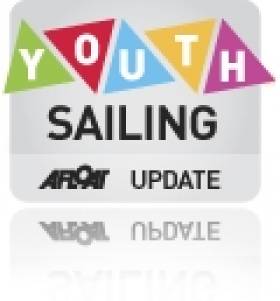Displaying items by tag: Eoin Keller
Royal Cork Yacht Club sailors have lifted two national titles at the 2011 Mitsubishi National Youth Sailing Championships this afternoon in a series cut short today by gale force winds on Dublin Bay. SCROLL DOWN FOR THIS AFTERNOON'S PRIZEGIVING PHOTOS.
Local knowledge offered no advantage as Dun Laoghaire co-hosts the Royal St. George YC, the National Yacht Club and the Royal Irish YC won none of the five national titles inspite of strong turnouts fielded by each of the waterfront clubs.
With winds gusting up to 25-30 knots and easterly winds causing a big swell, sailing for the final day of the ISA Mitsubishi National Championships was cancelled leaving the 300 sailors ashore. However all classes had completed sufficient races to complete the series.
The event was an important test event for Dun Laoghaire organisers of the Youth Worlds which will be held in the same venue from 12 -21 July 2012.
In a show of strength from the regions the three other titles went to other east coast clubs at Howth, Ballyholme and Courtown.
Immediately after the prizegiving, (photos below) Olympic Team Manager James O'Callaghan named the Irish team for the 2011 ISAF Youth World Championships in Croatia in July based on the weekend results. Listen to the podcast with the team manager, talking about the stand out performances of the weekend, the current strength of youth sailing in Ireland and the prospect of a top finish in Croatia.
Royal Cork YC achieved two national titles with Laser 4.7 event favourite Seafra Guilfoyle winning the title having previously dominated the Optimist fleet in previous years.
Brother and sister team Patrick & Chloe Crosbie also from Royal Cork won the 420 National title and Patrick was awarded the Training Grant for the most promising sailor at the event.
This event was the national trials for the Optimist class which was won by Tralee Bay sailor Sophie Browne who will travel to New Zealand in December to compete in the Optimist World Championships.
Irish optimist sailors are performing well internationally at the moment finishing fourth and fifth at the Braassemermeer Easter regatta. Other events during 2011 where there will be Irish representation include the European Championships in Portugal and the National Championships in Germany and the UK.
Top three results below. Click the links for full results class by class.
Laser Radial - full results here
National Champion: Philip Doran (Courtown Sailing Club)
2nd Robbie Gilmore (Strangford Lough YC)
3rd Eoin Keller (Lough Derg YC)
1st Girl Sophie Murphy Quoile Yacht Club
Laser 4.7 - full results here
National Champion: Seafra Guilfoyle (Royal Cork YC)
2nd Darragh O'Sullivan (Kinsale YC)
3rd Finn Lynch (NYC/Blessington SC)
1st Girl: Sian Kneafsey (National YC)
420 - full results here
National Champions: Patrick Crosbie & Chloe Crosbie (Royal Cork YC)
2nd Aodh Kennedy & Daniel Browne (Kinsale YC & Tralee Bay SC)
3rd Emma Geary & Niamh Connolly (Royal Cork YC & Baltimore SC)
Feva - full results here
National Champions: D Johnston & L Flynn Byrne (Howth YC)
2nd C Totterdell & S Craig (National YC/Royal St. George YC)
3rd C Mollard & J Harris (Howth YC)
Topper - full results here
National Champion: T Brow (Ballyholme YC)
2nd Laura Gilmore (Strangford Lough YC)
3rd Andrew Penney (East Antrim BC)
Optimist (Championship fleet)
1st Ben Walsh (Skerries SC)
2nd Ross Quirke (National YC)
3rd Colin O'Sullivan (Malahide YC)
Optimist National Trials
Sophie Browne (Tralee Bay SC) won the trials and took the option of travelling to New Zealand in December 2011 to represent Ireland at the Optimist World Championships.
The following sailors were selected by the trial process to represent Ireland at the European Championship which will be held in Portugal in July 2011: Sean Donnelly, HYC, Peter McCann RCYC, Harry Whitaker RCYC, Eoin Lyden RCYC, Jil McGinley RCYC Cliodhna Ni Shuilleabhain KYC and Megan Parker SSC
The team selected to travel to the German National Championships include Robert Dickson HYC , Daire Cournane KYC, Sean Waddilove Skerries SC, Richard Hogan HYC, Adam Hyland RSGYC, Ronan Cournane KYC, Sean Gambier Ross KYC and Fergus Flood HYC, Aoife Hopkins and Alacoque Daly Tralee Bay SC.
In addition 10 sailors were chosen for the Irish under 12 squad who will compete in the Optimist UK National Championships.
All our youth sailing news aggregated here
Prizegiving photos by Gareth Craig below. For daily on the water action: Day one photos here. Day two photos here. Day three photos here.






























































